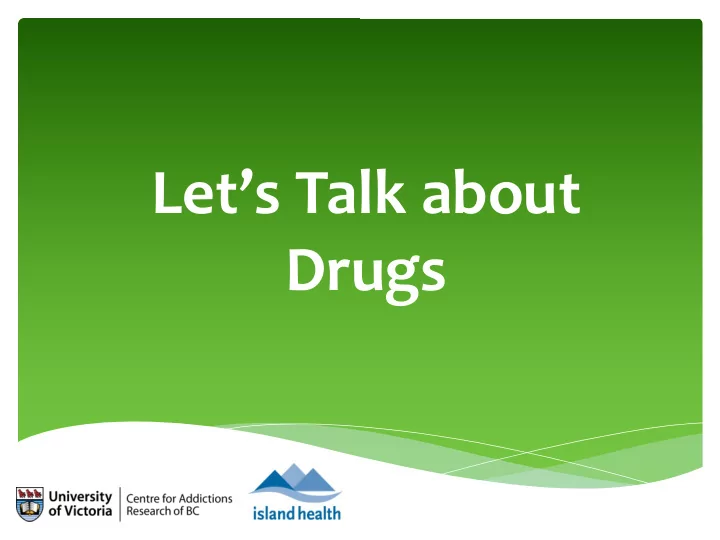

Let’s Talk about Drugs
Questions we hear from parents… * What kind of drug experiences might my child face? * What’s the best way to talk to my child about drugs? * What can I do to make my child less vulnerable to developing problems with drugs?
Drug use occurs on a continuum
How do we make sense of this data? How do the reasons relate to social and physical environmental conditions? How does the context influence the results of Context use? People use : … to feel good Drug Person … to feel better … to do better … to explore
Youth Substance Use - Current Trends Most youth use a variety of psychoactive substances. * E.g. 72% of 18 year olds have tried alcohol * Almost all use caffeine * Many will try cannabis and some will experiment with other drugs * For the most part use has declined over the last decade Reasons vary. * Fun (60% males/69% females) * Friends Were Using (33%) * Experimentation (28%) * To deal with stress & other emotions (21%) * 3% of males 4% females report feeling pressured to use * Source: AHS 2013
Decreasing rates of substance use Ever tried different substances Alcohol Marijuana Tobacco 70% 65% 64% 53% 43% 40% 35% 30% 35% 30% 24% 0% 2003 2008 2013
Using other substances 2013 Change since 2008 Prescription pills without a doctor’s consent 11% Mushrooms 7% Ecstasy 6% Hallucinogens 4% Cocaine 3% Inhalants 2% Amphetamine 1% Steroids without a doctor’s consent 1% Ketamine, GHB 1% NA
What do opioid deaths indicate about the scope of the crisis?
Population distribution of substance use, problems, and need for services (BC, 2009-10) Highly acute and chronic problems, including co-occurring mental and substance use disorders 0.3% 3.6% 8.4% Severity 9.2% Non-problematic 78.0% use, abstinence Adapted from: Rush B et al 2014. Development of a needs-based planning model for substance use services and supports in Canada: Final report 2010- 2014. Health Canada Drug Treatment Funding Program.
What’s the risk? It depends … * More drug equals more risk * Younger age equals more risk * Places, times and activities influence risk * Underlying factors influence risk * Some drugs are more dangerous than others
Developments * 2012 Take Home Naloxone Begins * 2013 Take Home Naloxone on Vancouver Island * 2014 Island Health team starts to carry naloxone * December 2015 * April 2016 * September 2016 * Overdose Prevention Services * Supervised Consumption Services * Opioid Agonist Therapy
Stigma Criminalization * Contributes to isolation, keeps the issue hidden. * Not likely to initiate a conversation about their use. Language Matters * Stigmatizing language discredits people who use drugs and can result in discrimination. * Stigmatization contributes to isolation and means people will be less likely to access services.
Naloxone and other Resources * Toward the Heart * Information * Videos * E-learning – complete naloxone training online * Finder (naloxone, OPS, safer sex/drug supplies) www.towardtheheart.com * Public Health Units * Pharmacies are starting to carry free Naloxone kits
… most young people who use alcohol and drugs during their teen years do not develop long term problematic substance use… Adolescent Health Survey 2013
What research shows and what we know about the war on drugs “Rat Park” video
We’re in this together!
Some Guiding Principals * Be available and try to listen more, talk less * How stirred up am I? Is now the best time…. * Ask questions. “what do you think….how do you want to handle this?” * How can you be a resource to your child around this topic? * Be clear about where you stand on the issue * If you find yourself getting reactive, don’t be hard on yourself…there’s always a next time to work at this! * The goal is to open up communication as a way of lowering risk * more connection and relationship = lower risk * Tone down the intensity!
Less helpful … * Ordering – “you must, you have to ..” * Advising – “Why don’t you … it would be best if ..” * Warning – “You’d better, if you don’t …” * Lecturing – “Do you realize, the facts are …” * Diagnosing – “What you need is, what’s wrong with you is …” * Moralizing – “You should, you ought to …” * Judging – “You are wrong, you are acting stupidly …” * Interrogating – “Why … who … how…”
Scenario… * My teen has started smoking pot and hanging out with friends who are smoking pot and drinking regularly. What’s the better way for me to handle this?
Some questions for discussion… * What do you notice about times when you are able to have the most effective conversations with your child about difficult topics, e.g., substance use? * What are you bringing to the conversation that seems to work well?
Question… When you are anxious and afraid for your child’s safety, what do you notice about how you interact or relate to your child?
Minimizing Risk/Maximizing Resiliency – what helps? * Enhancing belonging and connectedness * Supportive relationships Open conversations * Building agency and building a sense of purpose create trust, reduce * Building critical thinking and fear and make it social skills possible for us to learn * Nurturing recognition of from one another. fallibility * Opportunities for pro-social (and fun!) activities
Discovery Youth and Family Substance Use Services Free, Confidential, Voluntary Counseling Services for: Youth (13 -19) who use or are impacted by someone’s substance use Parents & Caregivers who are supporting a youth around substance use concerns Other community members that are engaged in supporting youth & families around substance use issues.
Thank you! ciandrew@uvic.ca www.helpingschools.ca Tracey.Thompson@viha.ca Reg.Fleming@viha.ca
Recommend
More recommend